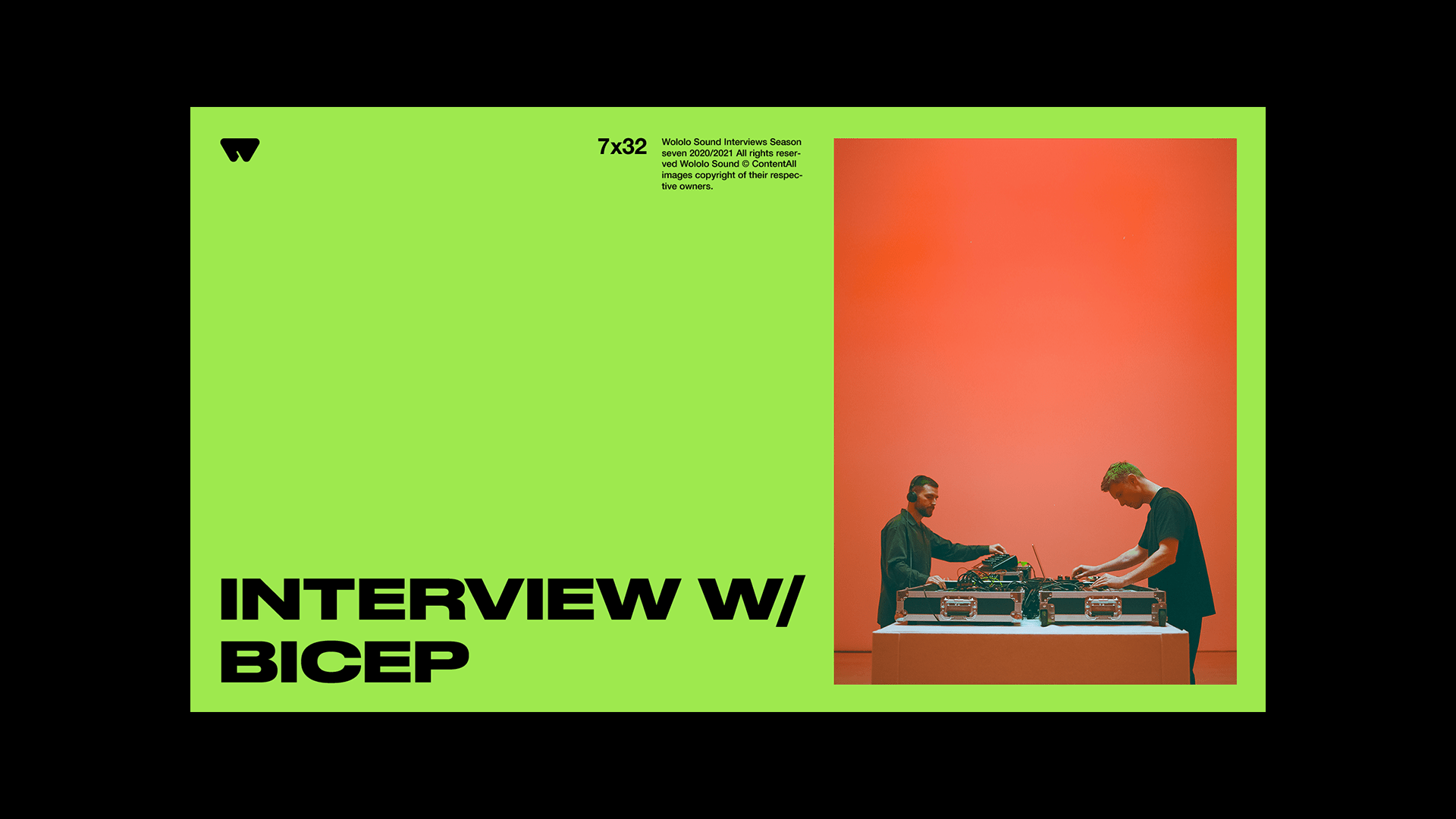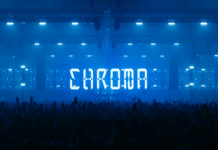Andrew Ferguson y Matthew McBriar, dupla de Belfast artísticamente conocida como Bicep, ha vuelto a lo grande tras un hiato de dos años sin publicar música, tiempo en el que se han dedicado a llevar su live show a diferentes rincones del mundo. Este 2021 ha supuesto su regreso a la senda de los lanzamientos con la publicación de ‘Isles’, su segundo álbum de estudio. Allá por 2017, el dúo norirlandés ya causó sensación en la escena electrónica con su álbum debut y homónimo, dejando patente su sello de identidad de melodías y polirritmos. ¡Y hoy les tenemos en Wololo Sound para que conozcáis mejor la trayectoria de su proyecto y curiosidades acerca de este nuevo LP!
Entrevista con Bicep / Interview with Bicep:
Wololo Sound: ¡Hola, Andy y Matt! Es un placer teneros con nosotros en esta entrevista con motivo de vuestro recién lanzado segundo álbum, ‘Isles’. Antes de que entremos en profundidad, ¿podríais contarnos cómo fue trabajar durante la pandemia?
Matt: Ha sido duro. Aún así, hemos estado muy ocupados, lo cual fue bueno dentro de lo que cabe. Hemos pasado tiempo en el estudio, del cual mucho ha sido fuera del confinamiento, ya que durante este no podíamos ir, por supuesto. Pero más allá de eso, hemos estado trabajando en los live streams y también ha habido muchas cosas de la campaña del álbum con las que hemos tenido que lidiar. Así que, obviamente, ha sido un año muy malo para el dinero, pero un año muy, muy productivo para el trabajo. Ya sabes, nos las hemos arreglado para mantenernos ocupados.
Andy: Hemos aprendido nuevas cosas del equipo que hemos tenido. Tenemos tantos sintetizadores y otras cosas aquí que este tiempo nos ha servido para sentarnos a conocer un poco más sobre ellos, también el estudio, y ponernos manos a la obra con la creatividad en las visuales y para el live show, cosa que a menudo no podemos hacer. Siempre se hace con prisas, pero hemos sido capaces de sentarnos con los videoclips y esas cosas y hablar con la gente, involucrarnos mucho y aportar ideas creativas con ellos en lugar de dejar que otra persona haga su movida.
Wololo Sound: Hi, Andy and Matt! It’s a pleasure to have you with us in this interview regarding to your recently released sophomore album, ‘Isles’. Before we dive into that, can you tell us how did you feel working during the pandemic?
Matt: It’s been tough. We’ve stayed super busy, though, which has been kind of nice. We have been in the studio, a lot of it apart from the lockdown, in which we haven’t been there, of course. But then, apart from that, we’ve been working on the live streams and there’s been a lot of stuff with the album campaign we’ve had to crack on with. So it’s been obviously a very bad year for money, but a very, very productive year for work. You know, we’ve managed to stay busy.
Andy: Just constantly learning new bits of equipment we’ve had. We’ve got so many synths and stuff here that this is actually the time we’re able to sit down and learn them a little bit, get to know the studio even better and also get more hands on with the artwork in the visuals for the live show, it’s like usually we can’t. That’s always kind of a rush, but we’re able to sit down with the music videos and stuff and actually speak to the people, get really involved and add some creative input into them rather than just let someone else do their thing.
Wololo Sound: Viajemos en el tiempo y vayamos unos años atrás. ¿Cómo os conocisteis? Mucha gente os conoció como bloggers antes de ser músicos, así que nos gustaría saber esa historia con todo detalle.
Matt: Bien, nos conocíamos de la escuela, cuando teníamos como 8 años, pero no empezamos a hacer música hasta que tuvimos más o menos como 20. Pero nos íbamos de fiesta juntos cuando teníamos unos 16. Entonces me mudé a Liverpool y después a Newcastle, y Andy se fue a Manchester. Y de hecho fue en ese momento cuando empezamos a crear un blog musical. Esto fue antes de YouTube o Spotify. YouTube existía, pero no para música. Solamente para vídeos de gatos.
Y nos centramos en este blog de música. Era solo una oportunidad para lo que pretendíamos hacer, que siempre fue destapar música sin escuchar. Queríamos subir música online que no existiera en ningún otro lugar. Queríamos publicar las caras B, rarezas y versiones extrañas. Era llamado a ser un lugar donde no podías obtener la música, y esos fueron nuestros primeros años. El blog fue creciendo y creciendo, y entonces llegamos a un punto donde yo estaba en el Medio Este y Andy se mudó a Londres; fue como: “De acuerdo, esto es potencialmente algo que podríamos hacer como un trabajo. ¿Deberíamos considerarlo?”.
Empezamos a escribir algo de música, pero no teníamos ni idea de lo que estábamos haciendo. Pero tuvimos un poco de éxito en las primeras piezas que hicimos y fue suficiente para dar algunos conciertos. Entonces, tomé la decisión de dejar el Medio Este y mudarme a Londres, y Andy iba a dejar su trabajo para que ambos nos dedicáramos a hacer música a tiempo completo. Eso fueron tres años de comer solo pan y pinchar solamente en tiendas de ropa y cosas así, ya sabes, muy duro. Pero seguimos.
Wololo Sound: Let’s go back in time some years now. How did you get to know each other? A lot of people know you as bloggers before you were musicians, so we’d love to know that story in deep.
Matt: Well, we knew each other from school, when we were like 8, but we didn’t really start doing music really until we were sort of like 20. But we were clubbing together when we were like 16. Then I moved to Liverpool and after that on to Newcastle and Andy went to Manchester. And it was only really then that we started to set up a music blog. This was before YouTube or Spotify. YouTube existed, but not for music. It was just cat videos.
And we did focus on this music blog. It was just a chance to what we aim to do, that was always to uncover unheard music. We wanted to put music online that didn’t exist anywhere else. We wanted to put up b-sides, rarities, strange edits. It was constantly meant to be a place where you couldn’t get the music, and that was our initial first few years. And the blog kind of grew and grew, and then it became to the point where when I was in the Middle East and Andy had moved to London, it was like: ‘Right, this is actually, potentially something we could do as a job. Should we consider it?’.
We started writing a bit of music, but we didn’t really know what we were doing. But we had a bit of success off the first bits we did. It was enough to give us some gigs. And then I made the decision to leave the Middle East and move to London and Andy was going to give up his job and we were both going to just focus on music full time. That was three years of eating only bread and like deejaying in only clothing stores and sort of like, you know, really tough. But we kept going.
Wololo Sound: Pues, siguiendo con esto, ¿cómo pasasteis de bloggers a productores? ¿Cómo surgió Bicep?
Matt: Con el tiempo, el blog se volvió menos importante y componer lo fue más. Fue como que, en lugar de pasar seis horas al día en el blog y una al día componiendo, empezamos a hacerlo al revés. Nos concentramos tanto en componer que se volvió muy emocionante. Y cuantas más oportunidades teníamos de pinchar, más veces nos ilusionábamos con hacer música. Verdaderamente pasó muy lentamente. Y aquí estamos, 11 años después y haciendo álbumes ahora.
Wololo Sound: So, going on with this, how did you go from bloggers to producers? How did you start Bicep?
Matt: Over time, the blog became less important and writing music became more important. It was like we started instead of spending five hours a day on the blog and one hour a day on writing, it was the other way around, one hour on the blog. We just became so focused on writing and it became really exciting. And the more we got a chance to deejay, the more we got a chance to kind of get excited about making music. It really developed so slowly. And here we are 11 years later and kind of doing albums now.
Wololo Sound: Y durante todo este tiempo suponemos que os habéis inspirado en una gran variedad de géneros musicales. ¿Cuáles de ellos se pueden encontrar en vuestro nuevo álbum, ‘Isles’?
Matt: Hay garage, hay pequeñas cosas y amagos de jungle…
Andy: Muchos elementos polirrítmicos que hemos extraído de artistas como Tool. Me gusta mucho escuchar bandas como esa, porque son casi cómicas en cómo cambian estilos y cómo todo es tan abiertamente polirrítmico. Definitivamente, creo que hemos explorado mucho más los elementos impredecibles de las bandas en este álbum y hemos creado momentos de calma y tensión. No es tan extremo, pero definitivamente cogimos un poco de inspiración en ese tipo concreto de enfoque de las bandas.
Wololo Sound: And during all this time we guess that you got influenced by a wide variety of musical genres. Which of them can be found on your new album, ‘Isles’?
Matt: There’s Garage, there’s like little bits and hints of Jungle…
Andy: Loads of polyrhythmic elements that are taken from artists like Tool. I really like to listen to bands like that, because they’re almost comical in how they change up styles and how overtly polyrhythmic everything is. I definitely think we’ve explored the unpredictability elements that bands have in this album a lot more and try to create calm to tension moments. It’s not as extreme, but definitely took a little bit of influence from those kind of like definite band approach.
Wololo Sound: Queremos que nos contéis más sobre este LP. ¿Cómo se os ocurrió el título del álbum?
Matt: Una vez ya terminamos el álbum. De hecho no teníamos ningún nombre antes, el nombre vino después. Fue como el hecho de mirar a todos los estilos que cubrimos a lo largo del álbum y es bastante obvio que hemos pasado la mitad de nuestra vida en Irlanda y la otra mitad en Londres.
Andy: Y es como un reflejo de las dos islas.
Matt: Sí, dos islas y las influencias. Irlanda es mucho más techno, trance, melódico, bastante “en tu cara”, música bastante agresiva. A los irlandeses les gusta la música bastante intensa. Londres es mucho más deep, con más influencias de todo el mundo. Es como jungle, garage, deep house, jazz… Hay cosas muy distintas. Somos bastante conscientes de que nuestro estilo, cómo enfocamos la música, se ha visto directamente influenciado por ambos lugares –que son bastante diferentes– y solo con el hecho de haber vivido en islas toda nuestra vida, nunca habiendo estado en la Europa continental, donde parece que todo es posible. Así que solo lo hemos reflejado en la música que hemos escrito y comprendimos que ‘Isles’ es una buena forma de resumirlo.
Wololo Sound: We want you to tell us more about this LP. How did you come up with the album’s title?
Matt: Once we finished the album. We actually didn’t have a name before, the name came afterwards. It was really like that we looked at all the styles that we covered across the album and it’s quite apparent that like half our life has been spent in Ireland and half our life is spent in London.
Andy: And it was just like a reflection of the two islands.
Matt: Yeah, two islands and the influences. Ireland is much more Techno, Trance, melodic, quite in-your-face, quite aggressive, the music. Irish people like quite intense music. London is much more deep, much more influences from all over the world. It’s like Jungle, the Garage, the Deep House, Jazz. There’s so many different things. We’re quite aware that our style, how we approach music, has been directly influenced by both places – they’re quite different – and just the living on islands our whole life, never being on mainland Europe, where everything seems possible. So we just reflected on the music we’d written and kind of understood that ‘Isles’ was a kind of a good way of summing up.
Wololo Sound: Algunos artistas eligen meticulósamente el orden de los temas en un álbum. En vuestro caso, ¿cómo de importante es el orden de reproducción de ‘Isles‘?
Matt: Pusimos el orden del álbum una vez terminamos de escribir toda la música. Así que no lo ordenamos a medida que lo escribimos. Hicimos como… 150 demos. Entonces, de esos, más o menos escogimos las que más nos gustaron y las terminamos. Y puede que de las últimas 20 canciones encajamos solo las que sentíamos que hacían un álbum consistente. Fue realmente una colección de lo que estuvimos haciendo, ya sabes. No hubo realmente un orden concreto que diseñamos desde el principio.
Seguramente nos apetecerá hacer un álbum con eso en mente en el futuro, construyéndolo uno por uno. Pero para nosotros fue muy importante, especialmente habiendo girado durante dos o tres años y sin tiempo para componer, el ser súper abiertos y libres y amplios y como dejar que ese álbum eventualmente se confeccionara de forma natural.
Wololo Sound: Some artists chose meticulously the order of the tracks within an album. In your case, how important is the running order of ‘Isles’?
Matt: We’d put the album order together after we’d finished writing all the music. So it wasn’t ordered as we wrote. We just made like… we did 150 demos. Then out of those, we kind of just picked the ones we like most finished them. And maybe out of the last 20 tracks, we just pieced together what we felt was a strong album. It was really just a collection of what we’ve been working on, you know. There wasn’t really a running order that we designed from the beginning.
We probably would like to approach an album in the future with that on mind, building it one by one. But for us it was really important, especially having toured live for two or three years and not have a chance to write music, to just be super open and free and broad and kind of allow eventually that album to kind of come together naturally.
Wololo Sound: Por último pero no menos importante, queremos destacar que el toque más distintivo de Bicep en esta pieza ha sido el samplear piezas turcas o búlgaras, por nombrar algunas. ¿Podéis contarnos más sobre esta parte tan importante en vuestras producciones?
Andy: Eso es solo la progresión natural de indagar música, fue más como… Creo que está definitivamente inspirado en Londres. Y yo vengo de estar junto a Matt en tiendas de discos durante todo el día. Simplemente con un par de cafés y sentándonos en un sótano. Hay uno en concreto en Stoke Newington al que solíamos ir por la mañana y pasábamos como seis horas clasificando discos y cobrando en los discos que queríamos.
Y la mayoría del tiempo no elegíamos temas que podíamos pinchar, era más como: “Este tema está reproducido a una velocidad incorrecta. Tiene una buena vocal en el medio. No tengo ni idea de quién es. No he escuchado nunca nada de este artista”. Eso era en el tiempo en el que Discogs también era bastante primitivo, y no podías encontrar mucha información.
Así que coleccionábamos sonidos para versionar nuestras sesiones. Hasta en el último álbum hay un montón de temas que empezaron a partir de un sample o de algún viejo disco que encontramos. Y quisimos recrear esa vibra o usar un poco de ella en ese tema. Así que viene de esa antigua cultura de indagar. Y también está inspirada por el hip hop antiguo, me encanta el viejo hip hop con grandes samples. Además, reunimos una multitud de samples de música del mundo como grabaciones de percusiones japonesas…
Matt: Como pop turco…
Andy: Y cosas con coros búlgaros, eso es una pasada. Yo hasta hay noches que me las paso en YouTube escuchando solo eso, solo mirando videos, porque te pone en un trance un poco raro.
Matt: De hecho hemos hecho una página web, bicepmusic.com/samples. En ella debatimos todo lo que tiene que ver con los samples que hemos usado en el álbum. Lo vamos a actualizar. Así que definitivamente echadle un ojo o apuntadlo.
Wololo Sound: Last but not least, one of Bicep’s most distinctive trademarks in this piece was the sampling of Turkish or Bulgarian pieces, to name a few. Can you tell us more about this important part of your productions?
Andy: That’s just the kind of natural progression from digging for music, it was more… I think it’s definitely London-inspired. And I was definitely born out of just me and Matt sitting in record stores all day. Just take a couple of coffees and sit down in a basement, there’s one in Stoke Newington in particular, that we used to go in the morning and spend like six hours actually sorting the records and getting paid in records we wanted.
And most of the time we wouldn’t even be getting tracks we would play, it would be a case of like: “This track is played at the wrong speed. It’s got a nice vocal in the middle. I don’t have a clue who it is. I’ve never heard of the artist before”. This is the time when Discogs was quite primitive as well, and you couldn’t really find lots of information.
So we were just collecting stuff to edit for DJ sets. Even in the last album, there’s a lot of tracks that started via like a sample or like an old record that we found. And we wanted to recreate that vibe or use a little part of that track. So it just comes from that old digging culture. And also it is inspired by old Hip Hop, like I love old sample heavy Hip Hop. And we just collected a mass of World Music samples like Japanese drumming recordings…
Matt: Like Turkish Pop…
Andy: And the Bulgarian choir stuff, that’s absolutely amazing. And like I’ll sit on YouTube some nights and just listen to that, just watching the videos, because it puts you in like a weird trance.
Matt: We’ve actually made a website, bicepmusic.com/samples. And in that we actually discuss everything about all the samples used in the album. We’ll be updating that. So definitely check it out or include that.








